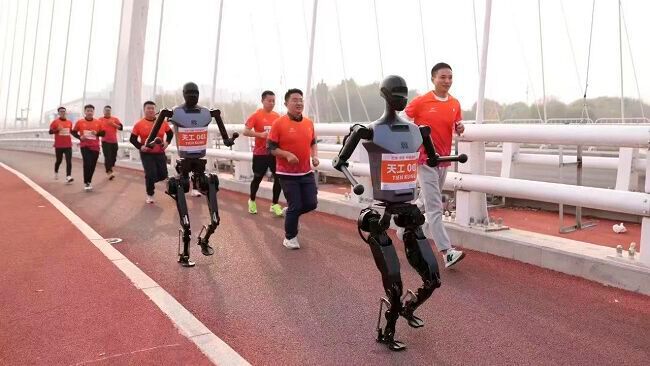China might currently be embroiled in a tariff war with the US, but its domestic tech industry is setting global benchmarks.
In a groundbreaking stride for embodied AI and humanoid robotics, China will host the world’s first humanoid robot half-marathon as part of the Beijing E-town Half Marathon on April 19, 2025. Originally scheduled for the prior Sunday, the event was postponed due to forecasts of strong winds, which could pose a greater risk to bipedal robots prone to tipping over due to limited training data for such conditions, according to experts. This milestone event, set in Beijing’s Yizhuang area—a hub for over 100 robotics companies backed by a 10 billion-yuan ($1.36 billion) government fund—underscores China’s ambition to dominate the frontier of humanoid robotics.

Spanning 21 kilometers, the half-marathon will push participating robots to execute approximately 250,000 precise joint movements, testing the limits of physical endurance and AI breakthroughs. The robots, required to mimic human-like running and walking motions, must complete the race within 3 hours and 30 minutes to earn medals, which were unveiled on Wednesday. The competition introduces unique rules: robots that skip battery changes at supply stations or are fully replaced during the race will face time penalties. “The competition adopts a comprehensive timing method,” said Wang Guolin, deputy head of the robot group, noting that the first robot to cross the finish line may not win due to penalties affecting final standings.
This event marks the first time humanoid robots will run the full Yizhuang Half Marathon course, a significant leap from their partial participation in previous editions. Awards will recognize robots that cover the greatest distance without battery swaps or substitutions. “The marathon is not only a challenge of physical endurance for robots but also a test of breakthroughs in artificial intelligence by the development teams,” said Li Quan, deputy director of the Yizhuang management committee, at a press conference. Safety is paramount, with teams tasked to ensure robots do not damage the track, other competitors, or spectators.
China’s robotics push is fueled by rising wages and a slowing economy, making automation increasingly attractive for companies aiming to cut labor costs and leverage technology. The rapid adoption of AI, spurred by successes like startup DeepSeek, has driven a surge in investment in humanoid robots and their industrial applications. The Yizhuang Half Marathon, with its robot-hosted opening ceremony, aims to showcase these advancements while fostering a “technological atmosphere,” as Li noted.
Participating firms have already begun testing their robot runners in Beijing, according to state broadcaster CCTV. As China accelerates its leadership in this high-stakes industry, the world’s first robot half-marathon is set to be a defining moment for the future of humanoid robotics, blending innovation, competition, and industrial ambition.